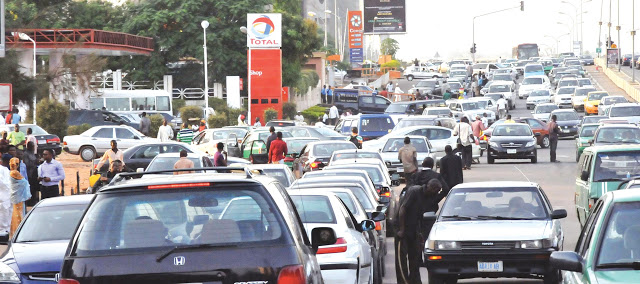 Motorists may have to endure two more weeks of fuel scarcity, according to the Nigerian National Petroleum Company (NNPC).
Motorists may have to endure two more weeks of fuel scarcity, according to the Nigerian National Petroleum Company (NNPC).
The organisation said yesterday that the scarcity which has paralysed socio-economic life in many parts of the country for the fourth week running, could be effectively over in two weeks time when the Kaduna Refining and Petrol-Chemical Company (KRPC) is scheduled to resume production.
The plant has not been producing on account of the vandalisation of the pipelines supplying it crude oil.
The pipelines have now been repaired, and the Group Executive Director (GED) and Chief Operating Officer (COO) Off-Stream Sector, NNPC, Alhaji Bello Rabiu Babura, declared yesterday that all is now set for the resumption of production at the plant.
Besides, the Petroleum Products Pricing Regulatory Agency (PPPRA) has decided to give 58.27 percent of its total supply of Premium Motor Spirit (PMS) in the second quarter of this year to the oil marketing companies.
The balance of 41.73 per cent will go to the NNPC.
The increase in the allocation of fuel to the marketing companies is to ensure that the product is easily available to motorists.
Babura, during a facility tour of the KRPC, said that the Warri and Port Harcourt refineries are also set for adequate fuel supply in the country.
“As you can see, the whole country is under siege because of fuel supply. We are looking at the entire value chain to solve the problem,” Babura told journalists during the tour.
“I came here to see the readiness of this refinery to be back on stream. We were actually having problem with the supply of crude oil to this place from Warri. It is about 640 kilometers line. That line is almost ready so that we would start pushing the crude here.
“At least in 10 days we would bring the crude to Kaduna, and about two or four days we would make everything ready. We want to make sure that in the next two weeks this refinery will be ready to start producing fuel. If that is done, the entire part of this country will be serviced with fuel”
“The state of the plant is in good condition. We have inspected it and right now they are actually ready to produce. In two weeks time we will start producing fuel. The workers have made sure that everything is ready for production to begin and nothing will stop them again. They will be ready to soon receive the crude and if the crude comes, we believe that everything will run smoothly”.
On the security of the pipelines to Kaduna, he said: “If you look at things now you will see that the government has security as its main pillar. We are working very hard now with the military under the Defence Chief to ensure that the pipelines are safe.”Now, as far as we are concerned we have no problem in the creeks; in fact for the first time in 10 years we have our lines from Bonny terminals to Port Harcourt delivering 100 percent. Again, for many years we could not actually deliver from the Excravos.
“We are trying to ensure maximum production now compared with what we had in the last 10 years when we produced under 23 percent. We believe that by the end of this month all the refineries in the country will work at a higher percentage.”
Also yesterday, Mr. Lanre Oladele said that the oil marketing companies will be receiving 58.27 percent of the total imported petrol in the second quarter while the balance of 41.73 per cent will go to the NNPC.
However, the agency will retain the retail prices of N86.00 for the NNPC and N86.50 for the other marketing companies.
Oladele said the pump price of Household Kerosene (HHK) also remains unchanged.
He advised the marketers to ensure that there is no price distortion in their retail outlets, warning that PPPRA “shall continue to monitor the global oil market performances, and come up, at appropriate time, with reasonable changes consistent with the newly-adopted price modulation principles.”
It asked depot owners to “strictly adhere to the prevailing truck-out policy put in place by the Agency, to ensure that petroleum products get to their designated retail outlets across the country,” and spoke of its commitment to “the sustenance of its reform initiatives, in order to further guarantee adequate supply of products nationwide.

